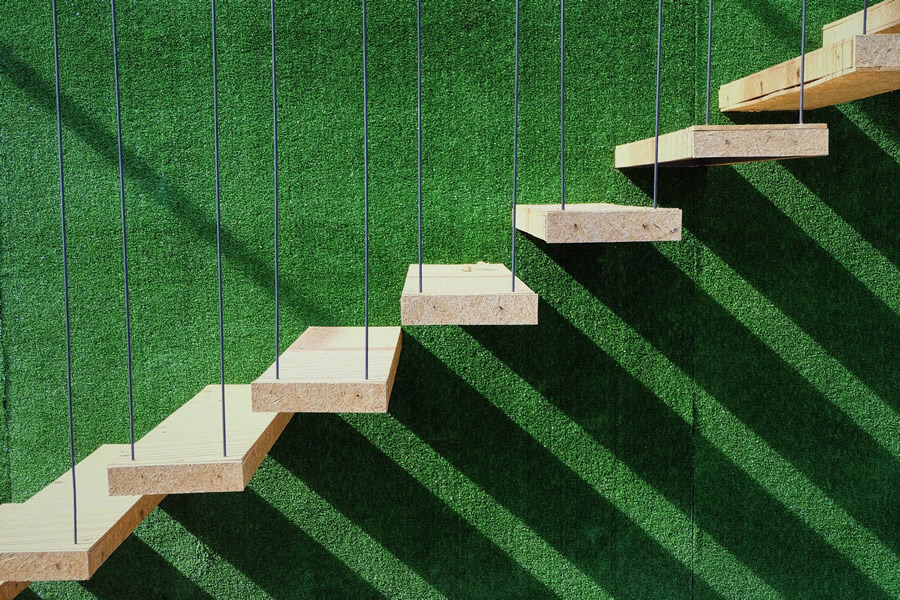“Sawubona” is the Zulu equivalent of “Hello” in the English language. Literally translated, this word means “I See You”. More than words of politeness, sawubona carries the importance of recognizing the worth and dignity of each person. It says, “I see the whole of you — your experiences, your passions, your pain, your strengths and weaknesses, and your future. You are valuable to me.”
If you would live in the northern parts of Natal in South Africa, this is how someone would greet you. In turn, you would reply by saying “Sikhona”, which means “I Am Here”. Peter Senge indicates that the order of the greeting is fundamental to the premise of the Ubuntu philosophy; You must been seen before you can exist. [1]
Humans, the most social of animals, are the outcome of hundreds of millions of years of evolution, and the reason we survived as a species is because of helping each other out, by creating communities, by teamwork.
Yet we have often heard that if we want to succeed in life, we need to subscribe to the idea of “survival of the fittest.”
But psychologist Paul Ekman reveals Charles Darwin’s real view of compassion — and it’s not what you might think. His belief that altruism is a vital part of human and even animal life is now being confirmed by modern science. [2]
Darwin’s thinking about compassion, altruism, and morality certainly reveals a different picture of this great thinker’s concerns than the one portrayed by those who focus on the catchphrase “the survival of the fittest”.
Compassion is the feeling that naturally arises when you learn of the suffering of another, and that motivates you to want to do something to help. Far from being just a social nicety, compassion has a great evolutionary purpose: Human offspring are the most dependent and vulnerable of any species, and need the most care from others to survive. This total dependence is why Charles Darwin said that sympathy is humanity’s strongest instinct. Simply put: Without compassion we wouldn’t survive. [3]
“Sticks in a bundle are unbreakable.”
Kenyan Proverb
Yet we have never felt more alone. In the wake of a global pandemic, loneliness has become a crisis of its own.
One in four EU citizens reported feeling lonely most of the time during the first months of the coronavirus pandemic, according to Eurofound survey data analysed in a new report from the JRC. This is more than double the levels of loneliness reported in a similar survey conducted in 2016. [4]
Available research shows that social connections are important for our well-being. Having support from family and friends is important for our happiness and health, and is also instrumental to our ability to share information, learn from others, and seize economic opportunities.
Social media is ever-present in modern society and has changed the way people communicate with those around them. Over the last two decades, social media has expanded exponentially, now comprising a variety of websites and applications used by people of all ages around the world. [5]
There have been two contradicting theories regarding social media use disorder and loneliness.
One has advocated that time spent online replaces time spent offline (which is time spent with friends), and thus the quality of friendships is reduced. This so called “displacement hypothesis” concludes that social media use increases the feeling of loneliness. [6]
“If every person who’s in pretty good shape can make a commitment to reaching out to one person they are concerned might be lonely once a week, that would be a good thing.”
Richard Weissbourd, psychologist, senior lecturer at the Graduate School of Education
On another hand, other studies have advocated that spending more time online enhances the quality of friendships, and thus the so called “stimulation hypothesis” concludes that social media use decreases loneliness. [7]
It is one thing to seek meaningful relationships whether online or offline, but it is another thing to accept alienation as a new norm. Loneliness and aloneness are therefore, not the same. Solitude enables you to develop strength of character and inspiration to come. Self-acceptance, and authenticity lead to self-actualization, and transcendence.
As Maslow would say: “Transcendence refers the very highest and most inclusive or holistic levels of human consciousness, behaving and relating, as ends rather than means, to oneself, to significant others, to human beings in general, to other species, to nature, and to the cosmos.”
The concept of “alienation” thus has ethical, existential and socio-political uses, and it can provide us with vital insights into human existence. [8]
Ramakant Sinari makes a distinction between “sick” and “healthy” forms of alienation to highlight that a certain form of alienation can be beneficial for the actual self. According to Sinari, sick forms of alienation occur when we are simply alienated from what is considered to be constitutive of the authentic self — when we do not experience any positive aspects from our alienation. The consequences of this form of alienation are somewhat familiar: crime, mental illness,suicide, social isolation, anomie and a general subjective disenchantment with the world.
In contrast, healthy forms of alienation contribute to our self-perception and how we perceive the world. They allow us gain new experiences and insights and use these in a manner that allows us to become more authentic.
As Sinari explains: “History would have been poor without Socrates, Christ, Moses, Buddha, Luther, Marx, Gandhi, who transcended their fellow men, made their own selves their abode, and eventually gave birth to new values.” [9]
We live in a world that doesn’t understand that boundaries can be transformed into horizons.
“Doing as others told me, I was Blind. Coming when others called me, I was Lost. Then I left everyone, myself as well. Then I found Everyone, Myself as well.”
Rumi
Therefore let’s choose to be motivating, but not manipulated. To be useful, not used. To make changes, not excuses. To excel, not compete. Let’s choose self-esteem over self-pity.
Like Thomas Merton wrote, “In a world of tension and breakdown, it is necessary for there to be those who seek to integrate their inner lives not by avoiding anguish and running away from problems, but by facing them in their naked reality and in their ordinariness.”
The charm of life exists precisely in its inconstancy. Between essence and appearance there is consciousness, there is oneness, existing in a delicate pirouette of transcendence and immanence, a coup de théâtre of higher awareness.
When we listen to our inner voice instead of the random opinions of others (although do take them into consideration as integral aspects of doing) we can choose to do things others won’t, and we can continue doing things others cannot.
We can then let go of certainty, by understanding that the opposite of certainty isn’t uncertainty, but openness, curiosity and a willingness to embrace paradox, rather than to choose sides — questioning things to the nth degree, understanding that healthy skepticism is an open door for novelty and other-worldliness to come in. When we practice the art of open-mindedness, and consistently embrace the art of hypocrisy, we can begin to understand that we are all fallible creatures who are prone to mistakes and tend to be afraid of being wrong.
Have no fear of being wrong. Have the courage to capitalize on your mistakes by making all stumbles, falls, or missteps a part of the overall sacred dance.
Realize that only by throwing ourselves off our high-horse, by diving off the pedestal, by laughing at what before we took too seriously, can we stretch ourselves into becoming.
When we become proactive citizens by promoting radical egalitarianism, thus curing the system of nature-deprivation and anoia, the disease of the soul that results when we forget our partnership in the sacred community of being, we can grasp that human beings have an innate need to expand consciousness and to experience direct relationship with the divine, and that spiritual impoverishment is directly related to our nature-deprivation, our systematic enslavement of each other, our bureaucratizing of the soul, and our misunderstanding of the fundamental interconnectedness of all things.
Instead of accepting human supremacy, the widely accepted cultural myth that produces catastrophic consequences for humankind and the environment, move towards what yogis know as ahimsa — the spontaneous expression of the highest form of love — the universal love, kindness, compassion and forgiveness — an unconditional sense of belonging to everyone and everything. [10]
“Watch your thoughts; they become words. Watch your words; they become actions. Watch your actions; they become habit. Watch your habits; they become character. Watch your character; it becomes your destiny.”
Lao Tzu
As we choose to live more from our inner center and feel this sense of oneness with others, our personality expands, and we become more kind, loving, forgiving, and compassionate. We come to understand that when we hurt others, we also wound ourselves; and when we don’t take care of ourselves, we negatively affect those around us. [11]
By taking care of our needs in a balanced and clear way we become healthy, happy, and calm. Then, from that place of balance and wholeness, we naturally want to extend ourselves to others — our family and friends, co-workers, community, the earth, and even our adversaries — in loving service. When we see ahimsa in action, it keeps us in positive connection with ourselves and the world.
Call it ubuntu, ahimsa, altruism or compassion, the message is fundamentally identical: there is underlying unity in all creation — at the deepest level, we are all one and the same.
[1] Peter Senge et Al., The Fifth Discipline
[2] Palouse Mindfulness, Survival of the Kindest, https://palousemindfulness.com/docs/survival-ekman.pdf
[3] Elisha and Stefanie Goldstein, Survival of the Kindest, https://www.mindful.org/survival-of-the-kindest/
[4] New report: Loneliness doubles in Europe during the pandemic, https://ec.europa.eu/jrc/en/news/new-report-loneliness-doubles-europe-during-pandemic
[5] Emily B.O’Day, Richard G.Heimberg, Social media use, social anxiety, and loneliness: A systematic review
[6] Kraut R, et al. Internet paradox: a social technology that reduces social involvement and psychological well-being? Am Psychol. 1998;53(9):1017.
[7] Shaw LH, Gant LM. Users divided? Exploring the gender gap in internet use. Cyber Psychology & Behavior. 2002;5(6):517–27.
[8] Gavin Rae, https://www.researchgate.net/publication/49763905_Alienation_authenticity_and_the_self
[9] Sinari, R. (1970) ‘The Problem of Human Alienation’, Philosophy and Phenomenological Research 31: 129.
[10] Sejal Shah, What is Ahimsa? All You Need to Know to Learn the Art of Non-Violence, https://www.artofliving.org/us-en/non-violence-and-the-art-of-ahimsa
[11] Irene (Aradhana) Petryszak, Do No Harm: The Art of Ahimsa, https://yogainternational.com/article/view/do-no-harm-the-art-of-ahimsa

